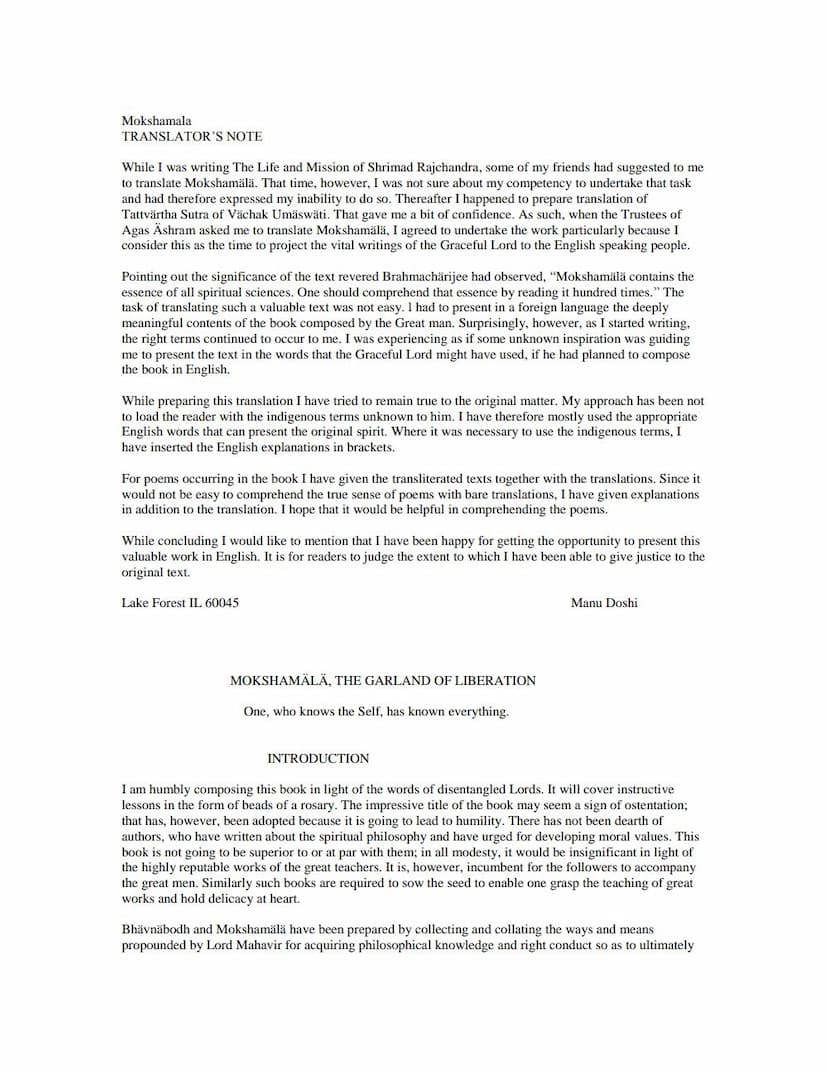Mokshamala
Added to library: September 2, 2025

Summary
Mokshamala: A Garland of Liberation
Introduction and Translator's Note:
"Mokshamala" by Manu Doshi, as presented here, is a profound compilation of spiritual lessons intended to guide individuals towards liberation. The translator's note highlights the immense significance of the text, describing it as containing "the essence of all spiritual sciences" and recommending it to be read multiple times. The translator emphasizes the challenge of presenting deeply meaningful Jain philosophy in English, aiming for accuracy and accessibility by using appropriate English terms and providing explanations for indigenous ones.
Author's Intent and Context:
The author, Shrimad Rajchandra, composed "Mokshamala" at a young age (16 years and 5 months) with the explicit purpose of presenting the path of Jainism in an instructive, "bead-like" format. He intended it to be comprehensible to everyone, from children to elders, to foster understanding and internalization of detached principles. The book is presented as a foundational text, with further commentary and advanced teachings (Prajnavabodh) existing separately. Extracts from Shrimad's letters reveal his flexibility regarding translation and presentation, prioritizing the inducement of readers to focus on the core spiritual message rather than sectarian differences.
Core Themes and Lessons:
"Mokshamala" is structured into numerous lessons, each delving into fundamental aspects of Jain philosophy and spiritual practice. Key themes and teachings include:
- The Nature of Reality and the Self: Lessons explore the impermanence of the material world, the true nature of the soul, and the concept of "know thyself" as paramount.
- The Impact of Karma: The text meticulously explains how actions (Karma) shape our present and future lives, leading to the diverse experiences and suffering observed in the world.
- The Value of Human Life: Human life is presented as a rare and precious opportunity for spiritual liberation, emphasizing the importance of discernment and virtuous conduct.
- Compassion as the Essence of Religion: Numerous lessons reiterate the Jain principle of "Daya Paramo Dharmaḥ" (Compassion is the supreme religion), highlighting its universal appeal and necessity for spiritual progress.
- True Godliness, Religion, and Guru: The book distinguishes between superficial beliefs and true spiritual understanding, defining these concepts based on omniscient beings and their teachings.
- The Path to Liberation: Throughout the lessons, the ultimate goal is liberation (Moksha), achieved through right knowledge, right perception, and right conduct, coupled with detachment and spiritual discipline.
- Ethical Conduct and Vows: Detailed discussions cover ideal householder conduct, the importance of vows (Pachchhakhän), and the meticulous observance of principles like celibacy, truthfulness, and non-violence.
- The Power of Contemplation and Meditation: Various forms of meditation are presented as essential tools for purifying the mind, eradicating karma, and realizing the true nature of the soul.
- Overcoming Obstacles: The text addresses common impediments to spiritual progress, such as attachment, desire, indolence, ego, and wrong perceptions, offering guidance on how to overcome them.
- The Importance of Society and Diligence: The book emphasizes the role of community in spiritual growth and the need for consistent effort and vigilance in spiritual practice.
- The Navkarmantra and its Significance: The sacred Navkarmantra is explained as a potent tool for spiritual purification and liberation.
- Jain Fundamentals (Nav Tattva): A significant portion of the book is dedicated to explaining the nine fundamentals of Jainism, presenting them as the complete framework for understanding the universe and the path to liberation. The text highlights the Syädväd (theory of relative perspective) as a unique and comprehensive approach to truth.
- Critique of Other Beliefs: The book offers a reasoned comparison of Jain philosophy with other religious and philosophical systems, highlighting its unique comprehensiveness and the fallacies in other viewpoints, while maintaining an impartial tone.
- The State of Liberation: The ultimate bliss of liberation is described as an ineffable state of eternal happiness and freedom from all suffering.
Structure and Presentation:
"Mokshamala" is presented in a didactic style, often using dialogues between a teacher and students or a father and son to convey its teachings. The lessons are concise yet profound, often including poems or illustrative stories to enhance understanding. The translator's dedication to presenting the material faithfully and accessibly is evident throughout.
Overall Significance:
"Mokshamala" serves as a comprehensive guide for spiritual seekers within the Jain tradition and beyond. It offers a structured and systematic approach to understanding the core tenets of Jainism, emphasizing practical application in daily life. The book's enduring value lies in its ability to distill complex spiritual concepts into accessible lessons, encouraging readers to embark on the path towards self-realization and ultimate liberation.